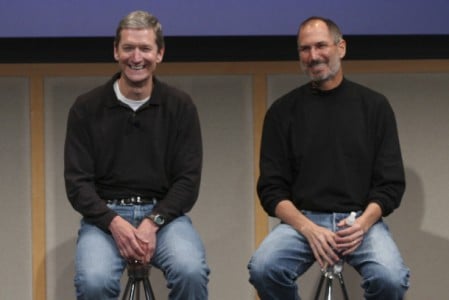
Preluand compania Apple dupa decesul lui Steve Jobs, Tim Cook avea in fata o munca titanica, trebuind sa preia o companie “pe val” de la un om adorat de milioane de persoane de pe glob. In cei peste 2 ani de activitate, Tim Cook a reusit sa mentina Apple pe linia de plutire si desi este caracterizat ca un conducator puternic, stilul sau de conducere este complet diferit de cel al lui Steve Jobs. Tim Cook este vazut ca fiind mult mai relaxat decat Steve Jobs, insa in realitate pasiunea sa pentru Apple se manifesta cu aceeasi intensitate, dar intr-un mod complet diferit.
I don’t think of Tim as laid back. In fact, he’s extremely intense. His intensity is just more quiet and dogged than Steve’s. Jobs routinely made a habit of calling people back mid-vacation […] for example, people had to work on Christmas Day because he decided he wanted a different color iPod shuffle at the last minute. Cook is also a better internal communicator. He sends out more all-staff emails and holds more town hall meetings. He also understands that people need to take vacations and have down time… Cook brings more efficiency and organization to Apple, which is good because the company’s increased size and scale requires a professional, consistent leadership style that is more inclusive than Steve Jobs’s was.
Spre deosebire de Jobs, Tim Cook stie sa comunice mult mai bine cu angajatii Apple, le intelege nevoile si nu obisnuieste sa-si cheme oamenii din mijlocul vacantelor pentru a lucra la produse, asa cum proceda Jobs. Cook este mai organizat si mai eficient decat Jobs, are un stil de conducere mult mai consistent, insa nu are aceeasi viziune pe care o avea fostul lider a celor din Cupertino. Ales de catre Jobs pentru a ii fi succesor, Cook este criticat pentru ca Apple nu mai produce aceleasi dispozitive inovatoare, aceleasi produse care incanta milioane de oameni de pe glob, insa ultimii ani au demonstrat ca Apple inca este capabila sa uimeasca.
In terms of profits and revenues, there is no question that Apple continues to be a successful company. But Apple’s own definition of success is much more. Its promise is to be exceptional – to make insanely great products that change the world. The latter is difficult to do without Steve Jobs’s reality distortion field. […] If Apple stays on the current trajectory, I think the danger is that it could turn into Sony.





















